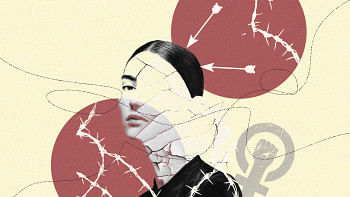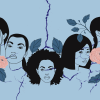Rape culture: What can be done?

Rape culture refers to a societal environment where sexual violence is normalised, excused, or trivialised. Cultural attitudes, media portrayals, and weak legal enforcement contribute to its persistence, creating barriers to justice for survivors and reinforcing cycles of silence and impunity. At its core rape culture is about power, the dominance of one person or group over another, often targeting, women, children, and marginalised communities.
Recent reports of sexual violence in Bangladesh have sparked national outrage. A woman was gang-raped for three hours on a bus. An eight-year-old girl lies on life support after a brutal sexual assault. A man harassed two women for smoking in public, triggering a mob that threatened them. Another mob freed a man accused of harassing a woman over her attire, celebrating him with a garland, pagri and the Quran. These incidents expose the toxic culture of misogyny, the devaluation of women, and the denial of bodily autonomy. This discussion focuses on four key factors that reinforce rape culture: language, social attitudes, traditional notions, and legal frameworks.
The power of words and tradition
Language shapes societal perceptions. In Bangladesh, derogatory slurs like magi (woman of loose morals), "whores,' "bitches," are normalised, reinforcing the idea that a woman's worth is tied to false notions of "purity," and she loses respectability if she does not observe conservative attire and decorum. However, purity, if the term must be used, refers to integrity and not attire and customs dictated by patriarchy.
I have attended religious sermons in both urban and rural areas. Let me be clear here. Not all of them are about how to control women, but many are. These sermons often preach how westernisation and modernisation are loosening men's control over women who now work in public, wear "inappropriate" attire, and reject male authority. Men are urged to keep women under strict patriarchal control to maintain the social order. Changing this narrative is crucial. Women must not be demeaned as sex objects, nor their self-worth reduced to submission to male authority.
Women's bodies have long been viewed as commodities belonging to men. In many rural areas, a raped woman is considered "dishonoured," forcing families to silence survivors out of fear of social ostracisation. Many are even forced to marry their rapists to restore family honour, furthering their victimisation. I remember a young woman who worked in my mother's house. She fled her village after being forced to marry her rapist. One day, her husband arrived and took her back. I watched her lonely silhouette disappear into the night. She said she had no choice; she had siblings to support, her family's honour to protect. At that moment, I realised the weight of social forces—there was nothing I could do.
The legacy of violence
During the 1971 Liberation War, the Pakistan Army used rape as a weapon, yet discussions of these crimes is often framed as the loss of women's ijjat (honour) rather than war crimes. A story from that time has always stayed with me. A teenage girl was advised by her aunt to take poison if the military tried to rape her. The girl retorted, "Why should I kill myself? I did not commit any crime." Her defiance is rare—most women are not socially conditioned to speak up.
In 1995, Yasmin Akhter, a 14-year-old domestic worker, on her way to her village was raped and murdered by three police officers who had offered her a ride. The officers were tried and hanged. The case became a landmark, leading to August 24, the day of her death, being observed as Resistance Day for Repression against Women. Yet decades later, rape culture persists in pernicious ways.
A broken legal system
Weak legal enforcement in Bangladesh enables perpetrators, especially powerful men, to evade justice. Police often refuse to register cases and humiliate survivors by questioning their morality. Even in media and legal discourse, rape is described as "losing honour" rather than a violent crime. In extra-judicial salishes, religious and social elites dictate punishments based on personal notions of morality rather than legal standards. Often, these salish judgments stem from property disputes or an elite man's sexual desires for the woman being punished.
According to Kaler Kantho, more than 27,000 rape cases and nearly 60,000 cases of violence against women were reported from 2019-2023. In 2022 alone, 4,762 rape cases were recorded, yet only 24 convictions were secured in Dhaka over five years. These numbers highlight systemic failures and the immense pressure survivors face to withdraw cases.
In 2025, rape cases continue to rise, with minors being targeted. In response, the government mandated that rape investigations be completed within 15 days and trials concluded within 90 days, with no bail for the accused. While a step forward, the real test lies in implementation. We need policy changes that provide better support for survivors–safe homes, more female police officers trained in handling sexual assault cases, counsellors for survivors and perpetrators (rehabilitation is essential, the death penalty does not cure the problem), and funding for education programmes.
Education and civic awareness: The path forward
Education is the most powerful tool against rape culture. Gender awareness must start in primary schools, despite opposition from those who benefit from the status quo. Once, in a village, I saw an NGO pamphlet illustrating domestic violence with a drawn image of a man beating his wife. A young man objected that the poster was teaching children that Bangladeshi men beat their wives. Due to local clergy opposition, the pamphlet was later revoked. This bending of the knee to powerful entities that want to ensure women's subjugation must be challenged.
Schools must integrate discussions on gender roles, toxic masculinity, and sexual harassment. Role-playing exercises, debates, and workshops can help young people engage meaningfully with anti-rape discourse and learning how to avoid words and behaviours that demean women. Teachers must be trained to lead these discussions with sensitivity, and parents and community members must be encouraged to see these ideas as beneficial for society. Local organisations working with women and children must be empowered to speak in public forums. Beyond education, we must rethink societal attitudes. Rape must be framed as a violent crime, not a loss of honour. Stricter penalties should be imposed on police and judges who fail to prosecute offenders.
Breaking silence
Many of today's survivors are speaking out, forcing society to reckon with its failures. Nowadays, women come forward to press charges against their attackers. University students are leading protests demanding accountability and justice. But why should women repeatedly march on the streets for their protection? Where are the law enforcement agencies, courts, and the state? Understandably, a radical change in power has created an infrastructural vacuum in society, creating opportunities for criminal activities. Even then, it is the state that must step up as the final guarantor of safety.
The anger and unity of the students mark a new era that must be sustained. It shows a young generation of women who will not be silenced, and these movements will organically connect to grassroots activism to spread greater awareness. We admire these courageous women who refuse to be muzzled. They are breaking the cycle of violence, naming their perpetrators, and reclaiming their voices—not just for themselves, but for all of us. We are with you, sisters!
Dr Lamia Karim is a Professor of Anthropology at the University of Oregon in Eugene, United States.
Views expressed in this article are the author's own.
Follow The Daily Star Opinion on Facebook for the latest opinions, commentaries, and analyses by experts and professionals. To contribute your article or letter to The Daily Star Opinion, see our submission guidelines.

 For all latest news, follow The Daily Star's Google News channel.
For all latest news, follow The Daily Star's Google News channel. 











Comments